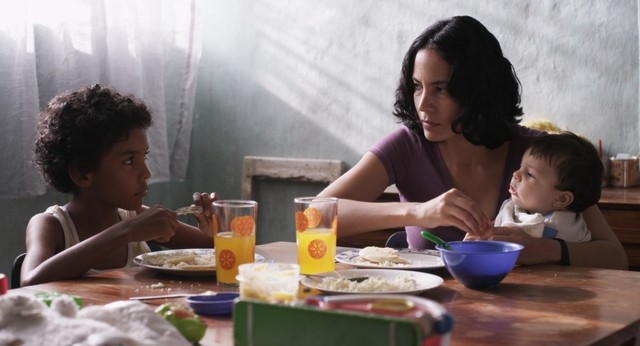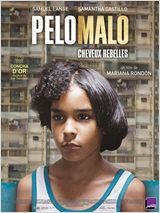 SAMUEL LANGE, SAMANTHA CASTILLO IN BAD HAIRGrowing up in the Caracas projects
SAMUEL LANGE, SAMANTHA CASTILLO IN BAD HAIRGrowing up in the Caracas projectsIn this distinctive if not altogether successful little film, 9-year-old Junior (Samuel Lange) lives with his mother and baby brother in Caracas working class housing, depicted with documentary realism in the last days of Hugo Chavez. Dreaming of looking like a pretty young pop singer, Junior wants to straighten his frizzy hair in time for a class photo that his young mother Marta (Samantha Castillo) hasn't the money to pay for. His fantasies of changing his appearance lead Marta to think him gay, which she partly blames on her own failure as a mother. This is only a motif in a movie that's mainly about poverty in urban Venezuela and the fragility of a single parent family with a baby, a small boy, and a mother who has lost her job as a security guard. Much of the misery and discomfort in the film comes from the desperation of life without a job. Her efforts to get it back or get another job like it are futile. The father of her children died in a shooting. His mother (Nelly Ramos), who is black, wants custody of Junior. To please him, she straightens Junior's hair one day, half way, with a blow dryer. What about Junior?
Is he gay? He seems only a skinny boy with delicate features, but there are quiet hints. He is fascinated by a handsome older boy (Julio Mendez) who runs the local newstand. He wants to take care of his mother and tells her he always will. Yet for much of the way David Rooney's statements about the film in
Hollywood Reporter linking this film to Alain Berliner’s
Ma Vie en Rose, Todd Haynes's
Dottie Gets Spanked, or Céline Sciamma’s
Tomboy, (whose young girl clearly wants a sex change) seem to be stretching things. Rondón seems to have other things in mind. Clearly,
Bad Hair is almost ruthlessly unsentimental. The relationship between Junior and Marta is uneasy. He must blame the lack of money on her. She lavishes most of her love on the baby, known, unceremoniously, as Baby, and regards Junior's possible oddity as a bother. The world outside is not friendly. There is none of the teeming intimacy even amid brutality of such Brazilian films as Hector Babenco's
Pixote or the hyper-violent, richly plotted
City of God. Marta resorts to sordid actions to regain her livelihood. Junion's reproachful looks seem justified, his forgiveness of his mother big spirited.
Bad Hair is "observational," which means it meanders without much plot or structure, which makes it a slow watch. As a slice of life it has many moments, but coherence is lacking. However, the cast deliver good performances, particularly Castillo and Lange: scenes were improvised throughout, without the use of a learned script. A reasonably complex portrait of the mother-son relationship emerges that leaves resolution and his future quite naturally out of reach, while the world of Venezuela's failed social experiment is intensely present.
Bad Hair/Pelo Malo, 93 mins., debuted at Toronto and San Sebastian Sept. 2013 and has been shown at many international festivals where the director has won numerous awards. In the US it debutsedat Tribeca 20 Apr. 2014, and showed at San Francisco 1 May, the day of its theatrical release in Venezuela. Screened for this review as part of the SFIFF. It opened theatrically in France and received generally favorable reviews (Allociné press rating 3.5). Also reviewed favorably, with some reservations, by Jay Weissberg in
[Variety. US limited theatrical release 21 November 2014 at Film Forum, NYC.






